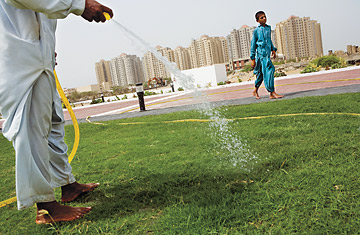
Access to the city's water is the key to new developments like Creek City in Karachi
(2 of 2)
If too much water is a problem, so is not having enough. The mayor is supposed to sit at the head of the Karachi water and sewage board, an ungainly and corruption-ridden department that governs the entire city's water supply. For politicians on the make, however, it is the ultimate prize. Fresh water is a scarce resource in Karachi; its steady delivery is often used to thank political supporters. Not only that, but the Karachi water board also has some 8,000 jobs available — invaluable political capital. Now this is where it gets complicated. For the past four years, Karachi has been governed by Kamal's party, the rough-and-tumble Muttahida Qaumi Movement (MQM) — which represents ethnic Mohajirs, who arrived in Pakistan from India at partition (think Richard J. Daley's men in Chicago, with mustaches), and was aligned with former general and current Pakistani President Pervez Musharraf. However, Sindh province, where Karachi is located, is run by the Pakistan People's Party (PPP), the national party that trounced Musharraf's early this year. (Benazir Bhutto was its chairwoman before she was assassinated.)
In May while Kamal, the mqm man, was in New York City attending a conference, the PPP provincial government staged a mini-coup, taking over Kamal's office at the water board, installing one of its own and removing Kamal's nameplate. Suleiman Chandio, the newly appointed managing director of the board, says the board was always under the jurisdiction of the provincial government. It was only under the military government of Musharraf that the valuable portfolio was handed to the mqm mayoralty in return for support. Besides, says Chandio, Kamal abused his position by giving only MQM supporters jobs at the board.
Kamal denies the accusations, pointing out that for the past two and a half years, he has spent nearly $500 million on water and sewer projects throughout the city, principally in impoverished districts that have never voted for his party. Bhit Island, a tiny sliver of land studded with concrete and corrugated-iron shanties a 10-minute ferry ride from the coast, is one such neighborhood. For decades the native Sindhi residents (and PPP voters) have depended on tanker boats to take water to the island. But in February, just before the elections, Kamal was able to finish an undersea pipe-laying project that delivered fresh water directly to the island for the first time. Walls in the village that once were emblazoned with only PPP slogans sport the red-green-and-white banners of the MQM these days as well. Each of the island's 1,200 or so houses now boasts a white plastic pipe topped by a red faucet handle.
Not all of them work. Corruption flows with water. Some families with influence — or cash — were able to install two faucets, which means that households farther down the pipeline receive none. The pump-house overseer estimates that 30% of the island's residents don't get the water they were promised. "What's the use of new water lines when there is no water in them?" asks Hoor Bhai Hajani, 60, matriarch of a family of 20. She gestures at the dusty faucet in her courtyard. A limp hose is coiled underneath, the deflated hope of her entire family. "We were so happy when we heard the news that the island would have water. Now it is just painful."
A month and a half after the board coup, the federal government stepped in and ordered the provincial government to give the water portfolio back to the mayor. Many suspect the reversal resulted from heated negotiations between the warring parties. Now Kamal has a vice chair, appointed by the PPP, in addition to the managing director. It's the kind of power-sharing arrangement that has marked Pakistani politics for the past several years. It's also the kind of agreement that has paralyzed progress. "The appointment of the managing director and vice chairman might create hindrance in planning and decision-making processes," says Kamal, but he's willing to wait and see.
The fight to control Karachi is a brutal political game. So why would the former IT Minister even want the job? Kamal throws his arms up in mock exasperation. "It's not a bed of roses," he concedes. "If I were given an opportunity to have an honorable exit, I would walk out right now."
But honorable for Kamal would be fulfilling his pledge. And the alchemic goal of a world-class city still beckons. Karachi's unruly sprawl of commercial and residential development has grown up around one of the most important harbors on the Arabian Sea. It occupies a strategic position between the Middle East and India that has made it a trading hub for centuries. It is also the gateway to Central Asia. "Karachi has so much potential," Kamal says quietly. "It is not just a city. It is the future of Pakistan. If Karachi develops and prospers, so will the country." Despite the frustrations, expect Kamal to pursue his goal.
— With reporting by Shahzad Shah Jillani